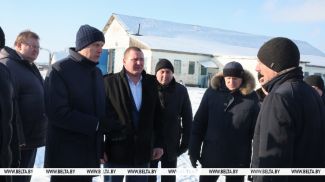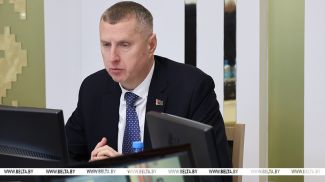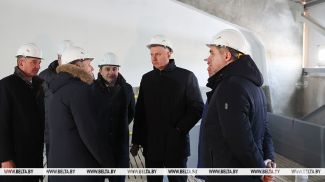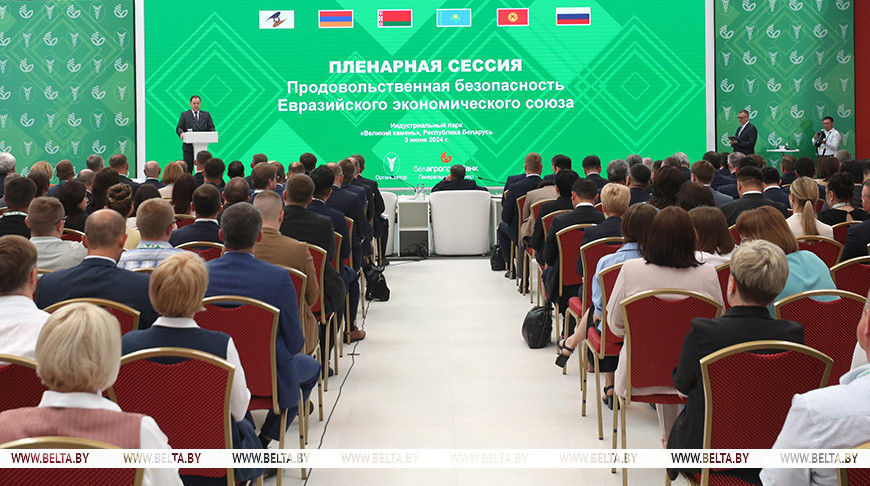
SMOLEVICHI DISTRICT, 3 June (BelTA) – Belarusian Prime Minister Roman Golovchenko laid out tasks for the EAEU in the agricultural sector as he spoke at the plenary session “Food Security of the Eurasian Economic Union,” BelTA has learned.
“I would like to draw your attention to the following tasks that are relevant for all members of the EAEU and the CIS. First, agricultural enterprises should increase their efficiency. Yields of the majority of crops in the EAEU member states lag behind those of the most developed countries 1.5-2 times. We should focus on seed breeding and production, on increasing the genetic potential of pedigree farm animals, on developing modern technologies for feed production, and on improving veterinary support for the sector. We need to join efforts to scale up the best practices in precision farming and increase the use of smart agricultural machinery,” said Roman Golovchenko.

Secondly, infrastructure issues impede the realization of the region’s potential in the agricultural industry.
“According to the Eurasian Development Bank, faulty logistics and storage systems account for the staggering 40% of losses of agricultural products in the EAEU countries. We need to join forces to find optimal and effective solutions in infrastructure and logistics that would help us improve transportation and storage of products. We need to build a network of wholesale distribution facilities for foodstuffs and agricultural raw materials that would be equipped with modern technologies in logistics and commodity flow management. It is critically important to build digital infrastructure that provides the market with feedback from businesses. It is also necessary to develop and introduce digital systems for product safety management and traceability of goods from field to counter,” the prime minister noted.

Third comes import substitution. “We urgently need to not only meet the EAEU’s needs for the most important types of agricultural products, but also to provide our farmers with high-quality domestic seeds. We can no longer depend on the import of planting material, plant protection agents, sophisticated equipment for crop and livestock production. It is impossible to revive our own breeding and genetics sectors on our own. This task requires the concerted efforts of all members of the EAEU,” the Belarusian head of government emphasized.

Fourthly, it is necessary to speed up the development of agriculture’s own scientific and technological base, carry out joint research and exchange best practices and innovative ideas. “We suggest developing interstate programs for critical sectors. Cooperation in the production of agricultural machinery has serious potential. We should strive for maximum localization. We should not waste time, we need to intensify work in this area using the existing financial support mechanisms for industrial cooperation,” Roman Golovchenko remarked.
EAEU countries pursue a coordinated agro-industrial policy. At the same time, each of EAEU member states uses its own economic mechanisms to regulate the agricultural market.
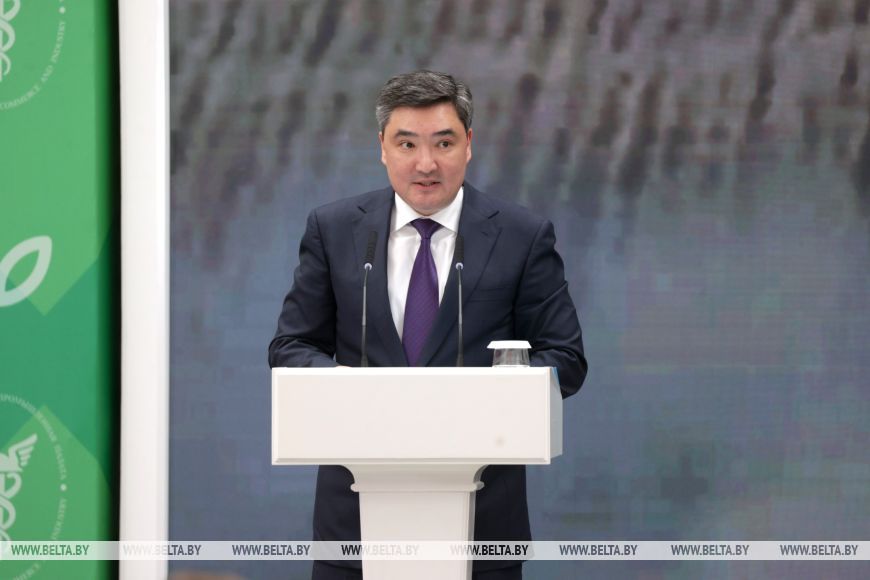
“This regulation partly hampers our progress. We believe that basic conditions for closer integration in the agricultural sector are already in place. I would like to invite the participants of the plenary session and the heads of government of the EAEU member states to revisit the possibility to develop a food security strategy for the EAEU and the action plan for its implementation. I hope that these proposals will be upheld, and their implementation will help bolster technologically advanced and competitive agricultural production,” the prime minister noted.
“I would like to draw your attention to the following tasks that are relevant for all members of the EAEU and the CIS. First, agricultural enterprises should increase their efficiency. Yields of the majority of crops in the EAEU member states lag behind those of the most developed countries 1.5-2 times. We should focus on seed breeding and production, on increasing the genetic potential of pedigree farm animals, on developing modern technologies for feed production, and on improving veterinary support for the sector. We need to join efforts to scale up the best practices in precision farming and increase the use of smart agricultural machinery,” said Roman Golovchenko.

Secondly, infrastructure issues impede the realization of the region’s potential in the agricultural industry.
“According to the Eurasian Development Bank, faulty logistics and storage systems account for the staggering 40% of losses of agricultural products in the EAEU countries. We need to join forces to find optimal and effective solutions in infrastructure and logistics that would help us improve transportation and storage of products. We need to build a network of wholesale distribution facilities for foodstuffs and agricultural raw materials that would be equipped with modern technologies in logistics and commodity flow management. It is critically important to build digital infrastructure that provides the market with feedback from businesses. It is also necessary to develop and introduce digital systems for product safety management and traceability of goods from field to counter,” the prime minister noted.

Third comes import substitution. “We urgently need to not only meet the EAEU’s needs for the most important types of agricultural products, but also to provide our farmers with high-quality domestic seeds. We can no longer depend on the import of planting material, plant protection agents, sophisticated equipment for crop and livestock production. It is impossible to revive our own breeding and genetics sectors on our own. This task requires the concerted efforts of all members of the EAEU,” the Belarusian head of government emphasized.

Fourthly, it is necessary to speed up the development of agriculture’s own scientific and technological base, carry out joint research and exchange best practices and innovative ideas. “We suggest developing interstate programs for critical sectors. Cooperation in the production of agricultural machinery has serious potential. We should strive for maximum localization. We should not waste time, we need to intensify work in this area using the existing financial support mechanisms for industrial cooperation,” Roman Golovchenko remarked.
EAEU countries pursue a coordinated agro-industrial policy. At the same time, each of EAEU member states uses its own economic mechanisms to regulate the agricultural market.

“This regulation partly hampers our progress. We believe that basic conditions for closer integration in the agricultural sector are already in place. I would like to invite the participants of the plenary session and the heads of government of the EAEU member states to revisit the possibility to develop a food security strategy for the EAEU and the action plan for its implementation. I hope that these proposals will be upheld, and their implementation will help bolster technologically advanced and competitive agricultural production,” the prime minister noted.





